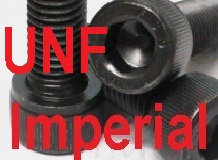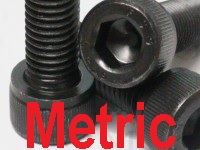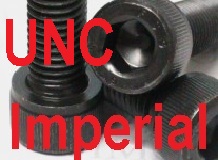Socket Head Cap Screws High Tensile Class 12.9 Plain Black Metric, Unc And Unf
Here's a detailed description of the differences between UNF, UNC, and Metric high tensile 12.9 socket head cap screws stocked at Bolts Nuts Screws Online:
1. UNF (Unified National Fine) High Tensile 12.9 Socket Head Cap Screws
Thread Type:
- Fine Thread: UNF screws have a finer thread pitch, meaning there are more threads per inch compared to UNC screws. This results in a stronger, more precise connection.
Applications:
- Precision Assembly: Due to the finer threads, UNF screws are often used in applications requiring precision and high strength, such as in aerospace, automotive, and high-performance machinery.
- Vibration Resistance: The finer threads offer better resistance to loosening under vibration, making them suitable for applications where maintaining a tight, secure fit is critical.
Key Characteristics:
- High Tensile Strength (Class 12.9): The UNF screws offer the same high tensile strength as other Class 12.9 screws, making them suitable for high-stress applications.
- Smaller Pitch: The finer pitch allows for greater thread engagement, which can distribute loads more evenly and reduce the likelihood of stripping.
2. UNC (Unified National Coarse) High Tensile 12.9 Socket Head Cap Screws
Thread Type:
- Coarse Thread: UNC screws have fewer threads per inch, resulting in a coarser thread pitch. This makes them quicker to install and less prone to cross-threading.
Applications:
- General Purpose Fastening: UNC screws are often used in general construction, automotive, and machinery applications where speed of assembly and ease of use are important.
- Tapping into Softer Materials: The coarser threads are better suited for materials like aluminum, wood, or plastic, as they are less likely to strip the threads.
Key Characteristics:
- High Tensile Strength (Class 12.9): Like other Class 12.9 screws, UNC screws are designed for high-stress applications, offering excellent strength and durability.
- Ease of Installation: The coarser pitch allows for quicker installation, making these screws a good choice for high-volume or less precise assembly processes.
3. Metric High Tensile 12.9 Socket Head Cap Screws
Thread Type:
- Metric Thread: These screws conform to the metric system, with thread pitches measured in millimeters. The pitch varies depending on the diameter of the screw, with options for both coarse and fine pitches.
Applications:
- Global Standard: Metric screws are widely used around the world, particularly in countries that primarily use the metric system. They are common in automotive, machinery, and manufacturing industries.
- Versatility: Metric screws are available in various pitches, making them versatile for a wide range of applications, from general-purpose fastening to precision engineering.
Key Characteristics:
- High Tensile Strength (Class 12.9): The high tensile strength ensures that these screws can handle demanding applications where durability and reliability are crucial.
- Compatibility: Metric screws are compatible with other metric components, making them ideal for use in international or global projects where standardization is important.
- Variety of Pitches: Depending on the specific application, you can choose between coarse and fine metric pitches to suit the needs of your project.
Summary of Differences:
- Thread Type: UNF screws have fine threads, UNC screws have coarse threads, and Metric screws have threads measured in millimeters with varying pitches.
- Application Suitability: UNF is used for precision and high-strength applications, UNC for general-purpose fastening, and Metric for global compatibility and a wide range of applications.
- Installation Ease: UNC screws are quicker to install, while UNF screws offer better vibration resistance and Metric screws provide flexibility in pitch choice.
Each type of screw is designed to meet specific requirements, ensuring that you can find the right solution for your particular application, whether it's for high precision, ease of installation, or global standardization.
Here's a detailed description of the differences between UNF, UNC, and Metric high tensile 12.9 socket head cap screws stocked at Bolts Nuts Screws Online:
1. UNF (Unified National Fine) High Tensile 12.9 Socket Head Cap Screws
Thread Type:
- Fine Thread: UNF screws have a finer thread pitch, meaning there are more threads per inch compared to UNC screws. This results in a stronger, more precise connection.
Applications:
- Precision Assembly: Due to the finer threads, UNF screws are often used in applications requiring precision and high strength, such as in aerospace, automotive, and high-performance machinery.
- Vibration Resistance: The finer threads offer better resistance to loosening under vibration, making them suitable for applications where maintaining a tight, secure fit is critical.
Key Characteristics:
- High Tensile Strength (Class 12.9): The UNF screws offer the same high tensile strength as other Class 12.9 screws, making them suitable for high-stress applications.
- Smaller Pitch: The finer pitch allows for greater thread engagement, which can distribute loads more evenly and reduce the likelihood of stripping.
2. UNC (Unified National Coarse) High Tensile 12.9 Socket Head Cap Screws
Thread Type:
- Coarse Thread: UNC screws have fewer threads per inch, resulting in a coarser thread pitch. This makes them quicker to install and less prone to cross-threading.
Applications:
- General Purpose Fastening: UNC screws are often used in general construction, automotive, and machinery applications where speed of assembly and ease of use are important.
- Tapping into Softer Materials: The coarser threads are better suited for materials like aluminum, wood, or plastic, as they are less likely to strip the threads.
Key Characteristics:
- High Tensile Strength (Class 12.9): Like other Class 12.9 screws, UNC screws are designed for high-stress applications, offering excellent strength and durability.
- Ease of Installation: The coarser pitch allows for quicker installation, making these screws a good choice for high-volume or less precise assembly processes.
3. Metric High Tensile 12.9 Socket Head Cap Screws
Thread Type:
- Metric Thread: These screws conform to the metric system, with thread pitches measured in millimeters. The pitch varies depending on the diameter of the screw, with options for both coarse and fine pitches.
Applications:
- Global Standard: Metric screws are widely used around the world, particularly in countries that primarily use the metric system. They are common in automotive, machinery, and manufacturing industries.
- Versatility: Metric screws are available in various pitches, making them versatile for a wide range of applications, from general-purpose fastening to precision engineering.
Key Characteristics:
- High Tensile Strength (Class 12.9): The high tensile strength ensures that these screws can handle demanding applications where durability and reliability are crucial.
- Compatibility: Metric screws are compatible with other metric components, making them ideal for use in international or global projects where standardization is important.
- Variety of Pitches: Depending on the specific application, you can choose between coarse and fine metric pitches to suit the needs of your project.
Summary of Differences:
- Thread Type: UNF screws have fine threads, UNC screws have coarse threads, and Metric screws have threads measured in millimeters with varying pitches.
- Application Suitability: UNF is used for precision and high-strength applications, UNC for general-purpose fastening, and Metric for global compatibility and a wide range of applications.
- Installation Ease: UNC screws are quicker to install, while UNF screws offer better vibration resistance and Metric screws provide flexibility in pitch choice.
Each type of screw is designed to meet specific requirements, ensuring that you can find the right solution for your particular application, whether it's for high precision, ease of installation, or global standardization.




